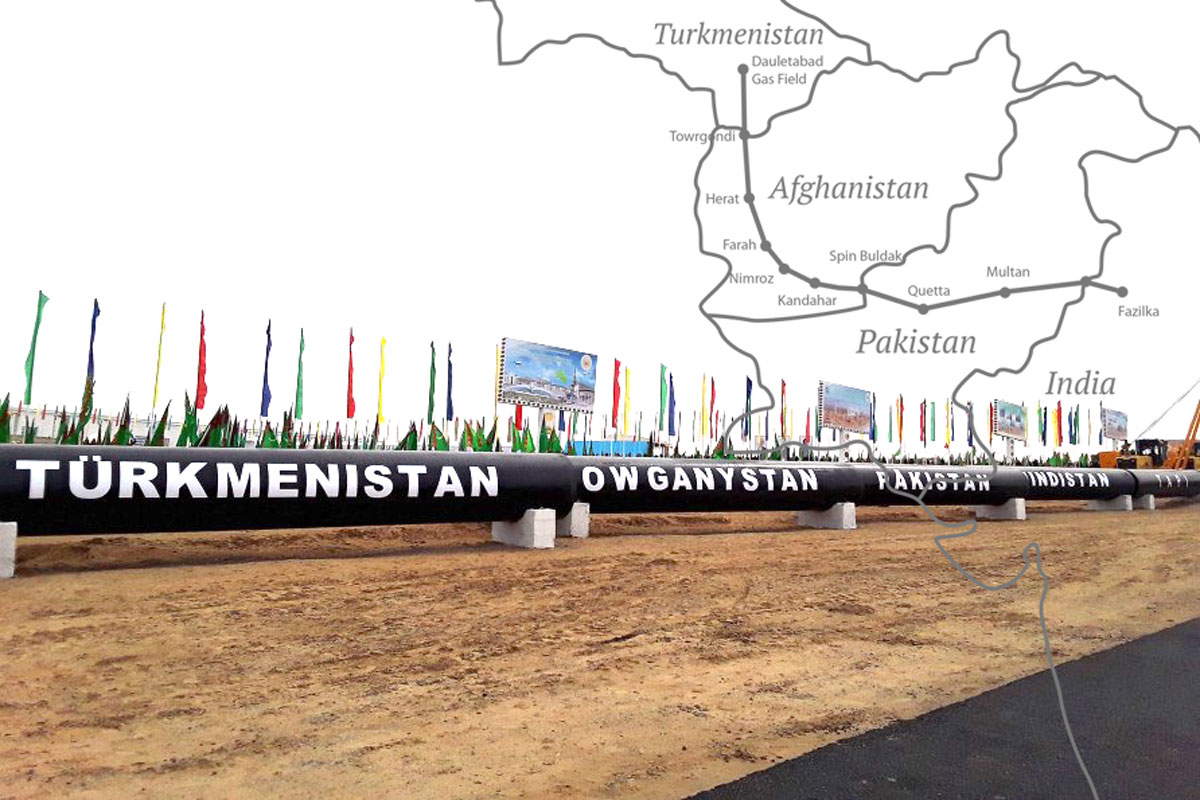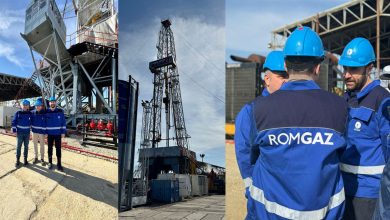TAPI to revitalize trade between Central Asia and South Asia
Turkmenistan ranks fourth in the world in terms of gas reserves, currently being among the main suppliers of ‘blue fuel’ in Central Asia. Given the favourable geopolitical situation and the rich hydrocarbon reserves, the Turkmen state benefits from special possibilities to increase gas exports to multiple directions, especially to the European and Asian markets.
In Turkmenistan, the gas mains are conceived for long-term supply of natural gas, which creates the conditions for implementing the international agreements on gas supply. They contribute to the successful implementation of the state energy strategy, which ensures the stable transmission of energy resources to the global markets.
An important aspect of the energy strategy of Turkmenistan is the expansion of the geography of routes for the export of Turkmen energy resources to the global markets, including by creating a multi-option transmission infrastructure. In this field, of special importance is the implementation of major investment projects, among which an important place is held by the construction of the gas pipeline Turkmenistan-Afghanistan-Pakistan-India (TAPI). This project will have an effect of boosting sustainable development, contributing to social and economic growth and ensuring energy security in the region – factors which, in turn, are the ‘backbones’ of the modern architecture of the energy space.
The project includes complex works of design, acquisition, construction, operation and maintenance of a pipeline with a length of 1,814 kilometres that will carry gas from Turkmenistan to Afghanistan, Pakistan and India. A section of 214 kilometres of the gas pipeline crosses Turkmenistan, a section of 774 kilometres will be installed in Afghanistan and one of 826 kilometres will go through Pakistan. It is expected that after the full commissioning of TAPI gas pipeline up to 33 billion cubic metres of gas will be exported annually, for 30 years. India and Pakistan will each buy 14 billion cubic metres/year, while the remaining of 5 billion cubic metres/year will be supplied to Afghanistan.
In a relatively short period of time, there was significant progress in the implementation of TAPI project, especially in terms of key agreements, such as the Agreements with the host countries and the Agreement on gas transmission. A strong impetus for promoting the project was given by the consortium TAPI Pipeline Company Ltd and later by the election of the State Concern Turkmengaz as leader of this consortium.
TAPI construction started in December 2015, in Mary region. The Presidents of Turkmenistan and Afghanistan, high-ranking officials of India and Pakistan took part in the solemn ceremony on the occasion of the welding of the first joint symbolic golden link of the new gas transmission artery. The laying of the 214-kilometre section of the gas pipeline in Turkmenistan was carried out by the State Concern Turkmengaz.
TAPI resource base in the initial stage will be the largest field – Galkynysh. As part of the development of this field, the State Concern Turkmengaz, together with its foreign partners, carries out various works aimed to provide ‘blue fuel’ for TAPI at a high-quality level.
A short history
The TAPI project was originally conceived in the 1990s with a view to monetize Turkmenistan’s gas reserves through gas exports via Afghanistan to Pakistan and India. The project will serve to connect the resourceful gas fields of Turkmenistan to energy deficient power economies in the Indian subcontinent by providing steady supply of natural gas to these countries. The project also has the potential to increase the regional co-operation between the participating countries and further promote security and political stability in the region.
In 2002, the governments of Turkmenistan, Afghanistan and Pakistan requested the Asian Development Bank (ADB) to become the Secretariat for a proposed Turkmenistan-Afghanistan-Pakistan (TAP) Natural Gas Pipeline Project.
In March 2003, India was invited to join the project. In its secretariat role, ADB has been assisting the government parties with the preparation of relevant studies in order to guide each government’s decision-making process in further developing the project and establishing the project’s legal framework.
TAPI project entered an active phase in 2010, when the Intergovernmental Agreement (IGA) between the four states was signed in Ashgabat.
Then, during 2012-2016, the legal framework of the project was successfully supplemented with the Gas Sale-Purchase Agreements with all the buyers, as well as with the agreements on shares and investments.
In 2013, the Governments of Turkmenistan, Afghanistan, Pakistan and India designated the state-owned companies – respectively Turkmengaz, Afghan Gas Enterprise (AGE), Interstate Gas Service (ISGS), and GAIL – to promote and invest in TAPI project. Additionally, ADB was appointed by the client as the Transaction Advisor (TA) to market the project and attract a suitable client to participate in the Project. In accordance to the transaction advisor’s technical studies the total cost of the project was estimated USD 10 billion.
Key points about the project
- TAPI Natural Gas Pipeline will deliver 33 billion cubic metres gas annually from Turkmenistan to Afghanistan, Pakistan and India. • The length of TAPI natural gas pipeline is 1,814 km.
- Total construction cost of TAPI pipeline is estimated to be USD 10 billion
- The total life of the project is expected to be 30 years.
- Afghanistan will receive annually approximately USD 400 million as a transit fee from TAPI project.
- The project will create thousands of new job opportunities.
The construction of the Afghan section begins
On 23 February 2018, in the Serhetabat district of Mary region and in the Afghan city of Herat, there were festivities marking the beginning of the Afghan phase for the construction of the Turkmenistan-Afghanistan-Pakistan-India (TAPI) gas pipeline, the installation of the electric power line and optic fibre communication line along the route Turkmenistan-Afghanistan-Pakistan (TAP), a well as the commissioning of the Serhetabat-Turgundi railroad. The events were attended by President of Turkmenistan Gurbanguly Berdymuhamedov, President of Afghanistan Mohammad Ashraf Ghani, Prime Minister of Pakistan Shahid Khaqan Abbasi and Indian Minister of State for External Affairs Mobashar Jawed Akbar.
Speaking on the occasion, the Pakistani Prime Minister said that the TAPI gas pipeline project was a historical opportunity to re-establish regional ties. “I assure you of Pakistan’s full commitment to the project,” he told the attendees of the inauguration ceremony. “We are turning TAPI into a reality and there will not be one gas pipeline here but several pipelines,” he added. “We will achieve six percent growth this year and you are all aware of the reality of the China-Pakistan Economic Corridor (CPEC), which is to provide the most efficient connectivity to the region.”
During the meeting with President Gurbanguly Berdimuhamedov, the Pakistani official highlighted the importance of the TAPI gas pipeline project, especially with regard to Pakistan’s rising energy needs.
Berdimuhamedov and Abbasi talked matters of mutual interest, the security situation in the Central and South Asian region, as well other issues pertaining to the TAPI gas pipeline project. Further, Abbasi underscored that the China-Pakistan Economic Corridor (CPEC) is a significant part of the One Belt One Road Initiative.
TAPI is progressing as scheduled, and in 2019 it is planned to start gas deliveries through the pipeline.
Besides the participating countries, which fully support TAPI, the Asian Development Bank is an important and long-term partner of the project. It participates in the project since its inception and continues to provide full support, including by granting low interest loans. Thus, an agreement was reached between the Government of Afghanistan and the Asian Development Bank, on funding the Afghan share capital in TAPI Pipeline Company Ltd.
Benefits
This mega project is expected to give a strong impetus to the development of economies in the region, will help improve the living conditions of the region’s population and, with the construction of a new social and industrial infrastructure, there will be opportunities to create additional jobs. TAPI will contribute to the formation of electricity, transport, communications and social infrastructure, gas representing not only energy, but also progress.
Furthermore, the construction of Turkmenistan-Afghanistan-Pakistan-India gas pipeline (TAPI), the installation of the electric power line and optic fibre communication line along the route Turkmenistan-Afghanistan-Pakistan (TAP) and the commissioning of Serhetabat-Turgundi railroad are meant to promote the social and economic development of Afghanistan, its consistent integration into the system of world economic relations, the country’s involvement in regional and international cooperation as an equal partner.
Representatives of the Turkmen, Afghan, Pakistani and Indian governments are working very closely, as TAPI project is extremely important for the development of the region’s economy, primarily for the industrial sector, for large and small businesses. Thus, local contractors will be involved in delivery and construction works. Countries participating in the project will receive a cheaper, more economic and greener energy source as well as additional gas transit revenue.
The implementation of TAPI project will have a positive impact on the socio-economic development not only of the participating countries but also of the countries in the region as a whole. Turkmen gas will help meet the growing need for ‘blue fuel’ in India and Pakistan, where demand for energy may double by 2030. After the implementation of the TAPI project, India will have its first trans-national gas pipeline. Currently, the country buys gas in liquefied form and transports it with tanker trucks. Bangladesh has also expressed interest in this project.
Investment opportunities
TAPI will serve as a source of power and energy for industries, which could use its gas as their power supply. Establishing gas based medium capacity power plants and gas-consuming industries will be productive and useful investment. Such power plants and grids will provide solid investment opportunities for domestic and international manufacturers and provide small industries the chance to grow and create needed jobs.
Moreover, TAPI as a large pipeline construction project will create significant windows of opportunities for companies to participate in the construction of the pipeline and offer employment opportunities for many.
Through TAPI project, Turkmenistan contributes significantly to the development of friendly relations and mutually beneficial cooperation to ensure prosperity and sustainable development both on a regional and global scale, playing an active role in revitalizing the Silk Road, which for thousands of years has bound the peoples of Eurasia and has played a significant role in the progress of human civilization.







